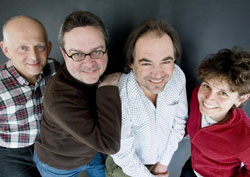Linking theory, practice and faculties

Tom Waugh, Martin Allor, Daniel Cross and Elizabeth Miller are working together to promote the interests and efforts of Canadian documentary filmmakers.
Photo by andrew dobrowolskyj
Communication Studies Assistant Professor Elizabeth Miller used to divide her time between New York, where she worked as a video documentarist , and North Hampton, New Hampshire, where she taught film and video production.
Moving to Montreal allowed her to be in a city with both “a community of engaged film-makers and an inspiring academic environment.”
That desire to bring theory and practice together is behind the Concordia Documentary Centre, originally the idea of Film Studies Professor Tom Waugh and Communication Studies Profes-sor Martin Allor.
They imagined the project as a way to bridge common interests between the Faculties of Fine Arts and Arts and Science. When documentarist Daniel Cross and Miller joined those two faculties, Waugh and Allor were able to “bring two active filmmakers who teach into the equation,” Miller said.
The timing is right because disenchantment with corporate media sources and with government mean that “more and more people are turning to documentaries as a source of information.”
Together they organized the Visible Evidence conference last August. The five-day event featured discussion during the day and screenings programmed by Bernard Boulad of Rencontres internationales du documentaire in the evening. It was also a catalyst to launch the Documentary Centre and to bring theorists and filmmakers together to exchange ideas about current trends.
The event also confirmed the need for ongoing exchange. Miller describes the Documentary Centre as a “connective tissue” between “academics who can provide resources and reflection, and filmmakers who are often over-stretched, engaged people.”
Cross’s leadership in the Documentary Organization of Canada reinforces that connection. Many of current filmmakers concerns about funding, copyright, and the distribution potential of new technologies will be explored as research themes by the Centre.
Cross organized the Documentary and Democracy panel of Visible Evidence. Papers from that panel and others addresssing the intersection of documentary, digital media and democracy are being organized for publication. Miller also made that the theme of her special topics course this year. Issues raised during the conference are being explored more fully with students in the classroom.
Incorporating students into the project led the Documentary Centre to work with Media Studies student Ezra Winton, whose Cinema Politica film series regularly screens documentaries.
Starting this month, the Centre is sponsoring seminars by Canadian film-makers in conjunction with Cinema Politica. The first talk on March 3 featured Nadja Drost, a Toronto filmmaker whose Between Midnight and the Rooster’s Crow won best Canadian documentary at last year’s Hot Docs competition, had been screened earlier that week. Mary Ellen Davis will discuss her film Haunted Land on March 13.
Miller said that the Centre is working towards a virtual presence on the web and a physical space some time in the future.
In the meantime, Miller sees issues raised through the centre spilling into her own practice as a filmmaker. Her feature-length film on the impact of water privatization, Water Warriors, will be completed soon.
“As a filmmaker, this dialogue is helpful. I’m excited about where this film can go.”
